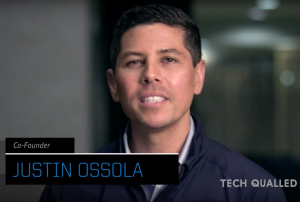You wouldn’t expect someone who spent the last ten years flying helicopters in the Navy to make a good salesperson, but I’ve found that many of the skills and experiences I’ve had in my last ten years with the Navy are the same skills and experiences your top salesmen have.
This was my opening line whenever an interviewer asked me to talk about myself. Like you, my identity for the past ten years revolved around my military service. There were many things I expected to struggle with  going into my transition out of the Navy. How would I find my new identity? How would I regain confidence in my work that I had spent ten years developing? How would I continue to support my family? I knew it was going to be a challenging and daunting process. Luckily, one of the things I had decided on was Tech Qualled. Through my training, I learned all about the technology space; the difference between a server and a switch, cybersecurity, data center solutions, cloud, and IOT. Additionally, the program taught me how to get started in a sales role, and how to find my voice in a new role.
going into my transition out of the Navy. How would I find my new identity? How would I regain confidence in my work that I had spent ten years developing? How would I continue to support my family? I knew it was going to be a challenging and daunting process. Luckily, one of the things I had decided on was Tech Qualled. Through my training, I learned all about the technology space; the difference between a server and a switch, cybersecurity, data center solutions, cloud, and IOT. Additionally, the program taught me how to get started in a sales role, and how to find my voice in a new role.
Learning How to Fish
Tech Qualled’s Launchpad Academy program can be described in many ways, but the best summary for me is that they ‘teach you how to fish’. This model works in high tech sales training because you learn the material through your own efforts; through trial and error. You can read all the sales training books out there, but all of that is more or less academic. We all know that practice makes perfect, but most of us hate to practice. TQ takes a practicum-based approach, leveraging their connections within the tech industry to assign respected sales leaders as role players. This is when the training started to pay off for me. The scenario-driven role-playing exercises and interview training in Fort Worth, TX was excellent; and challenging. I was able to find my voice and to identify the skills I had developed during my time as a helicopter pilot that would translate nicely into a sales role.
Top Salesmen Beginnings:
When I finally began garnering interest from various high tech companies shortly after graduation, I was expected to conduct ad hoc sales pitches with limited information and to answer questions such as ‘how I planned to succeed in a sales role with no experience’. Tech Qualled had prepared me and I was ready to ace any interview. Now, I didn’t become the world’s top salesmen or the best public speaker in my time at Tech Qualled. The program is good, but no program is that good. Conversely, Tech Qualled made what is notoriously a difficult transition more manageable and gave me the tools to succeed in my new role in tech sales. It provided me the blueprint for how to be ready for an interview, how to prepare for a sales call, and how to close both. These skills coalesced from the online training and the completion of the in-person boot camp and came together just in time to weather the strain of literally moving my family across the country, missing a connecting flight but still getting to my interview on time.
If finding comfort and clarity despite chaos sounds like your kind of challenge and you’re interested in a rewarding and exciting career in tech sales, then you should be applying to Tech Qualled right now. For those who have served, being a veteran will always be a part of our identities. As for me, my suit’s hanging bag is now my carry-on; but more importantly, I have an opportunity to work for an amazing and exciting company. I now have a plan for the next year to forge my identity, voice, and confidence in my new role at an exciting FinTech company while becoming top salesmen.
****
Mark Rothschild is a former Navy helicopter pilot, a graduate of the U.S. Naval Academy and recent Tech Qualled candidate. He transitioned out of the Navy in August and is launching his sales career at nCino, a North Carolina based FinTech company and worldwide leader in cloud banking.


 Qualled
Qualled 


 here he majored in Economics and General Engineering. After serving 6 ½ years on active duty aboard various US Navy warships, Kevin joined DeGolyer and MacNaughton in 2013. At D&M, Kevin served as an Economist, appraising oil fields and reservoirs all across the globe, but focusing primarily on European and African assets for major, integrated oil companies.
here he majored in Economics and General Engineering. After serving 6 ½ years on active duty aboard various US Navy warships, Kevin joined DeGolyer and MacNaughton in 2013. At D&M, Kevin served as an Economist, appraising oil fields and reservoirs all across the globe, but focusing primarily on European and African assets for major, integrated oil companies.

 technology sales. My background, USCGA 88′, Duke MBA, and 12 years as an MBA admissions director, gives me some insights into helping you pick your best path if you are deciding between an MBA or Sales.
technology sales. My background, USCGA 88′, Duke MBA, and 12 years as an MBA admissions director, gives me some insights into helping you pick your best path if you are deciding between an MBA or Sales.
 Don Dixon, Andrew’s father, said certain sectors in technology have been more receptive to veterans. He noted cybersecurity is an area where veterans can thrive because the companies’ missions are often aligned with national security interests, and there are more direct applications for military experience. Peter Dixon had a security clearance that proved helpful when he started his first technology job at cybersecurity startup ThreatMetrix.
Don Dixon, Andrew’s father, said certain sectors in technology have been more receptive to veterans. He noted cybersecurity is an area where veterans can thrive because the companies’ missions are often aligned with national security interests, and there are more direct applications for military experience. Peter Dixon had a security clearance that proved helpful when he started his first technology job at cybersecurity startup ThreatMetrix.

 efficiencies and increase costs. Think about it — trust is critical to almost any relationship we have: in the office or at home, with our doctor or our elected officials. Naturally, certain relationships require more trust than others, however, the absence of trust is disabling. I’m sure most of us have experienced how difficult it can be to lose the trust of someone else. Decisions become fraught with suspicion, simple communication turns complicated and everything slows down. This made me wonder how trust plays a part for military veterans that are taking off the uniform and assimilating into civilian life.
efficiencies and increase costs. Think about it — trust is critical to almost any relationship we have: in the office or at home, with our doctor or our elected officials. Naturally, certain relationships require more trust than others, however, the absence of trust is disabling. I’m sure most of us have experienced how difficult it can be to lose the trust of someone else. Decisions become fraught with suspicion, simple communication turns complicated and everything slows down. This made me wonder how trust plays a part for military veterans that are taking off the uniform and assimilating into civilian life. question to answer, especially when the question is coming from a veteran and directed toward someone who isn’t. What surprised (and impressed) me most was the simplicity and confidence in his answer: “veterans do what they say they are going to do”. He followed up with a number of other qualities, but it was clear his primary message was that he felt veterans are very good at keeping their commitment.
question to answer, especially when the question is coming from a veteran and directed toward someone who isn’t. What surprised (and impressed) me most was the simplicity and confidence in his answer: “veterans do what they say they are going to do”. He followed up with a number of other qualities, but it was clear his primary message was that he felt veterans are very good at keeping their commitment.
